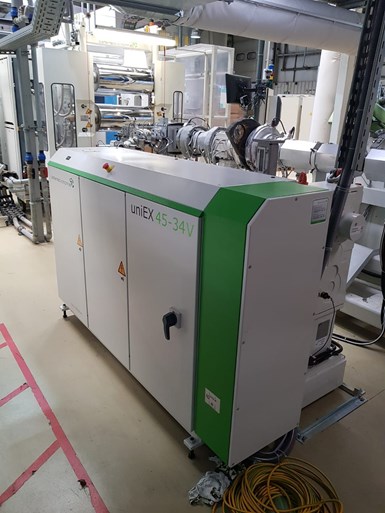Compact Coextruders for Sheet
Extruder series featuresa compact design, wide processing window and high throughputs with gentle melt treatment.
Originally developed for polyolefin pipe production, battenfeld-cincinnati says its uniEX single-screw extruder series can be deployed in sheet applications as well. The uniEx extruder series features a compact design, a wide processing window and high throughputs with gentle melt treatment. This reportedly makes them ideal as a coextruder.
A smaller footprint is achieved via a U-shaped design, allowing the machines to be installed much more compactly than previous models. This also ensures shorter melt channels, which in turn has a positive effect on purging time and material consumption, the builder says.
The series is available in three sizes (35, 45 and 60 mm) in output rates range from 110 to 1102 lb/hr, depending on the material. The pronounced modularity of the extruders enables them to perform virtually any type of special processing task. A wide range of different plasticizing units is available to cover every application.
The uniEx series come with a choice of either grooved or smooth feed zones. The extruders can be fitted with a degassing unit when the application requires, as is the case of ABS processing, for example.

Moreover, a great variety of different mechanical engineering options are available, such as screw extraction to the rear, a gearless drive via torque motor or flexible positioning of the control cabinet. Extensive standardization in production ensures high and above all fast availability of parts and consequently short delivery times and quick troubleshooting in case of problems, says battenfeld-cincinnati.
Related Content
-
Formulating LLDPE/LDPE Blends For Abuse–Resistant Blown Film
A new study shows how the type and amount of LDPE in blends with LLDPE affect the processing and strength/toughness properties of blown film. Data are shown for both LDPE-rich and LLDPE-rich blends.
-
Avoid Four Common Traps In Granulation
Today, more than ever, granulation is an important step in the total production process. Our expert explains a few of the many common traps to avoid when thinking about granulators
-
Understanding the ‘Science’ of Color
And as with all sciences, there are fundamentals that must be considered to do color right. Here’s a helpful start.














.png;maxWidth=970;quality=90)